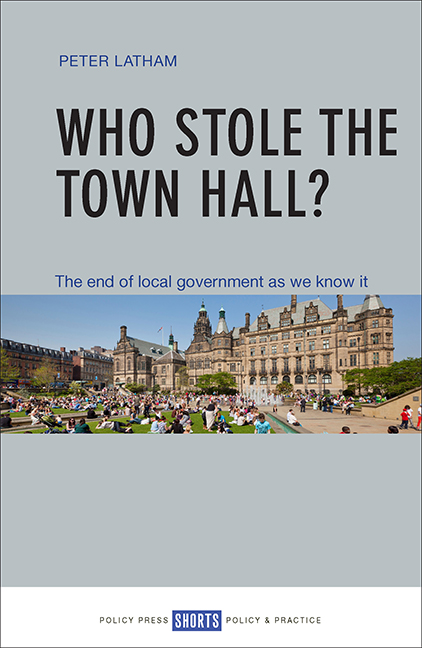Book contents
- Frontmatter
- Dedication
- Contents
- List of tables
- Acknowledgements
- Foreword
- About the author
- List of abbreviations
- Introduction
- 1 The Localism Act, Open Public Services and the neoliberalisation of councils
- 2 Imposed ‘metro’ mayors: new wine in old bottles
- 3 Police and Crime Commissioners: another ‘half-baked import’
- 4 Local government finance
- 5 Towards a new basis for federal, regional and local democracy
- References
- Index
4 - Local government finance
Published online by Cambridge University Press: 05 April 2022
- Frontmatter
- Dedication
- Contents
- List of tables
- Acknowledgements
- Foreword
- About the author
- List of abbreviations
- Introduction
- 1 The Localism Act, Open Public Services and the neoliberalisation of councils
- 2 Imposed ‘metro’ mayors: new wine in old bottles
- 3 Police and Crime Commissioners: another ‘half-baked import’
- 4 Local government finance
- 5 Towards a new basis for federal, regional and local democracy
- References
- Index
Summary
This chapter looks at the financial provisions of the Localism Act and subsequent legislation relating to local government finance; focuses on recent and future trends in public and private sector employment; analyses trends in UK public expenditure; discusses local government finance in the UK; shows that some councils, which have been cut harder than the rest of the public sector, are already becoming financially unviable; and concludes that the council tax, stamp duty land tax and business rates should be abolished and replaced by a system of land value taxation plus a wealth tax and more progressive income tax to fund increased provision of directly provided public services.
Financial provisions of the Localism Act and subsequent legislation
Pay
Since the financial year 2012/13 local authorities have had to publish an annual pay policy statement, which must be approved by a resolution of that authority before it comes into force. The Localism Act 2011 specifies a number of elements that must be covered by the statement, including the level and elements of remuneration for each chief officer; remuneration of chief officers on recruitment, and increases and additions to remuneration for each chief officer; the use of performance-related pay for chief officers; the use of bonuses for chief officers; the approach to the payment of chief officers on their ceasing to hold office; the publication of and access to information relating to remuneration of chief officers; and requires each local authority to define its ‘lowest-paid employee‘, in conjunction with setting out its policy on low pay (see sections 38–43).
European Union financial sanctions
By 2008, over 50% of the domestic regulation concerning local government in Britain originated in the neoliberal EU. The list of council services affected includes community cohesion, social services, regeneration, procurement, performance and environmental standards. Furthermore, Brussels now has the second-highest lobbying presence after Washington; and the EU's current direction, as John Foster (2011, pp 28–9) showed, is ‘strongly against the interests of working people’ because:
• EU directives commit it to introducing competition into all staterun utilities and services.
• EU policy (Europe 2020) commits it to achieving a fully flexible labour force and reducing the level of the social wage and pensions by 2020.
- Type
- Chapter
- Information
- Who Stole the Town Hall?The End of Local Government as We Know It, pp. 95 - 126Publisher: Bristol University PressPrint publication year: 2017



